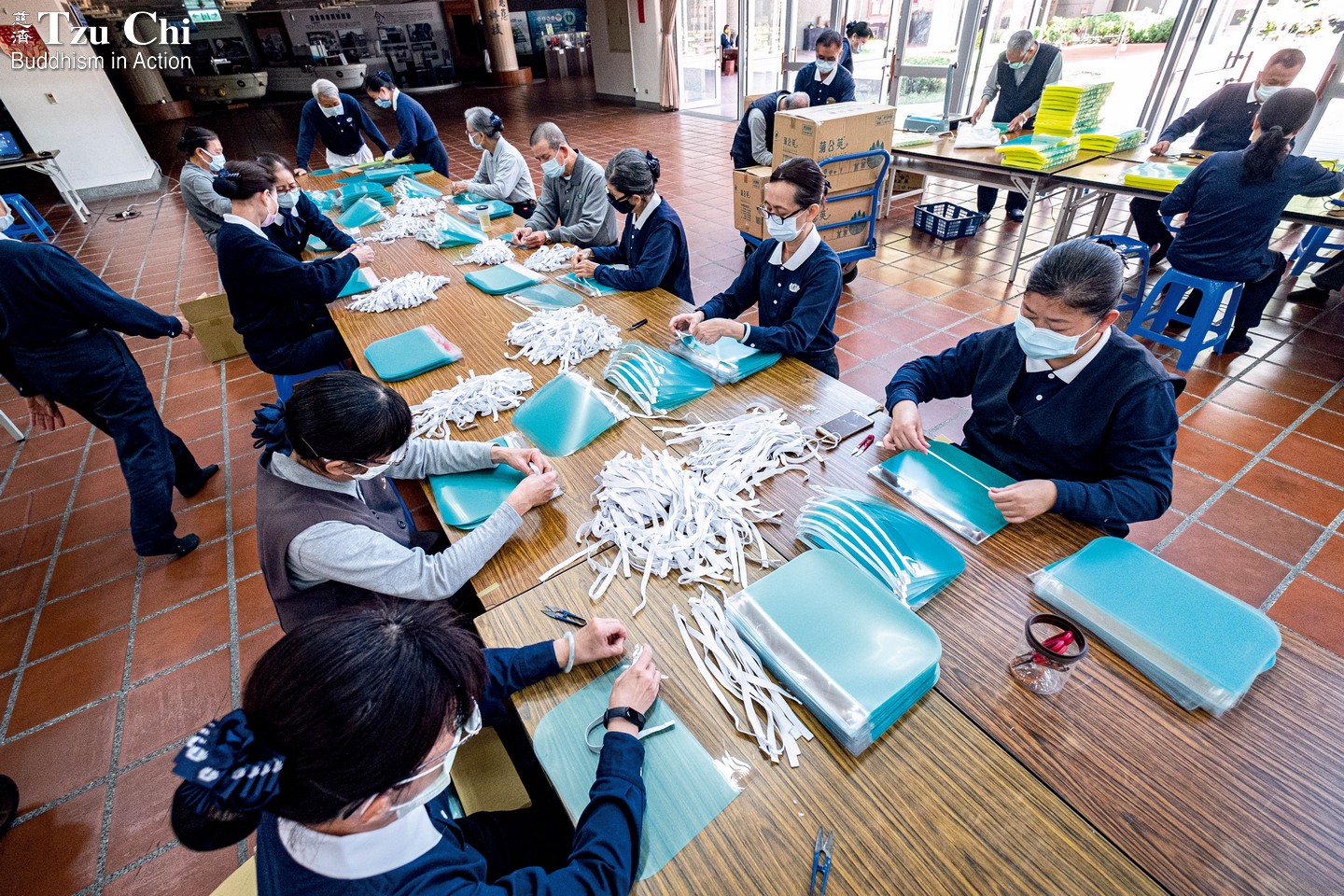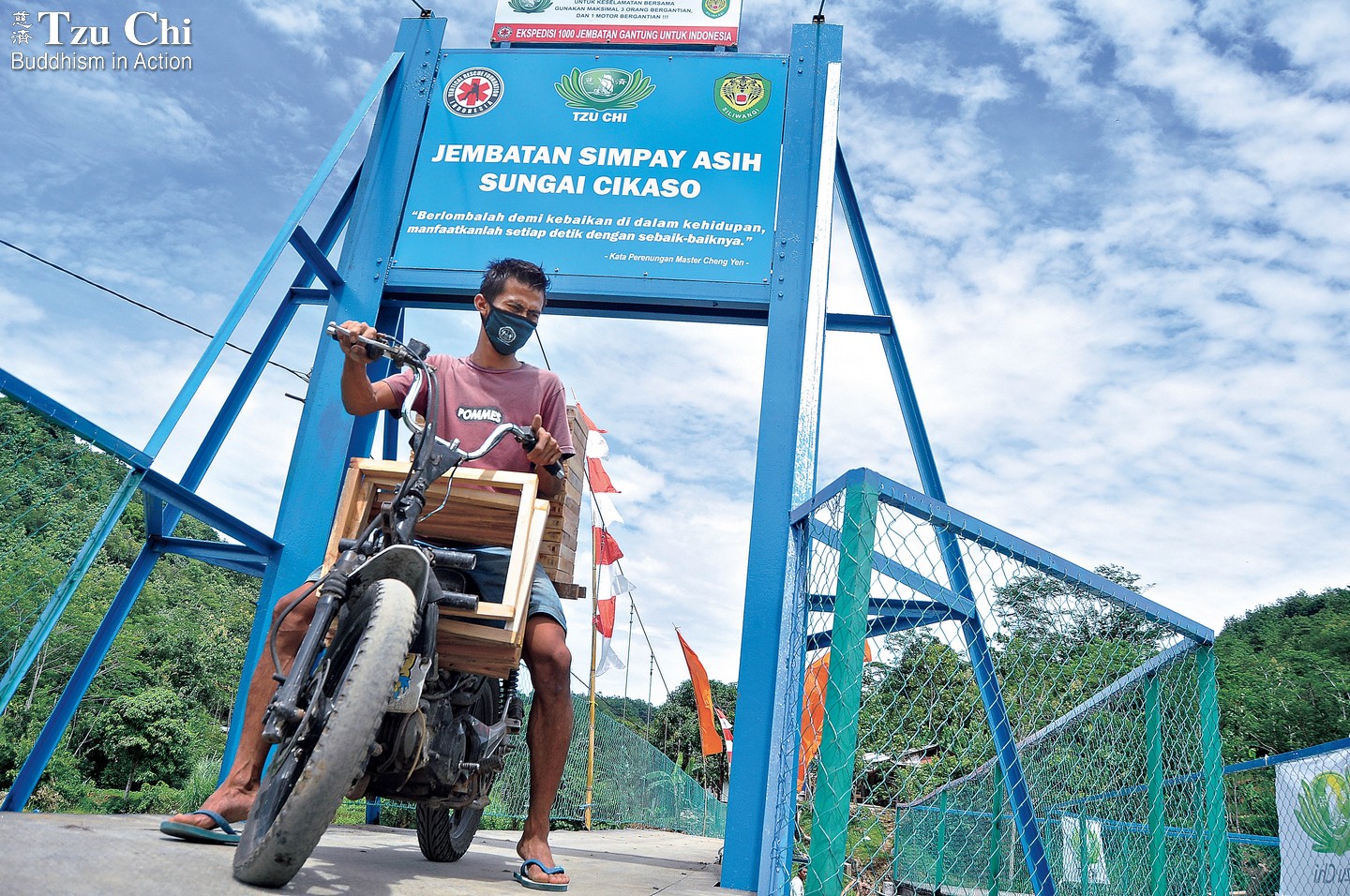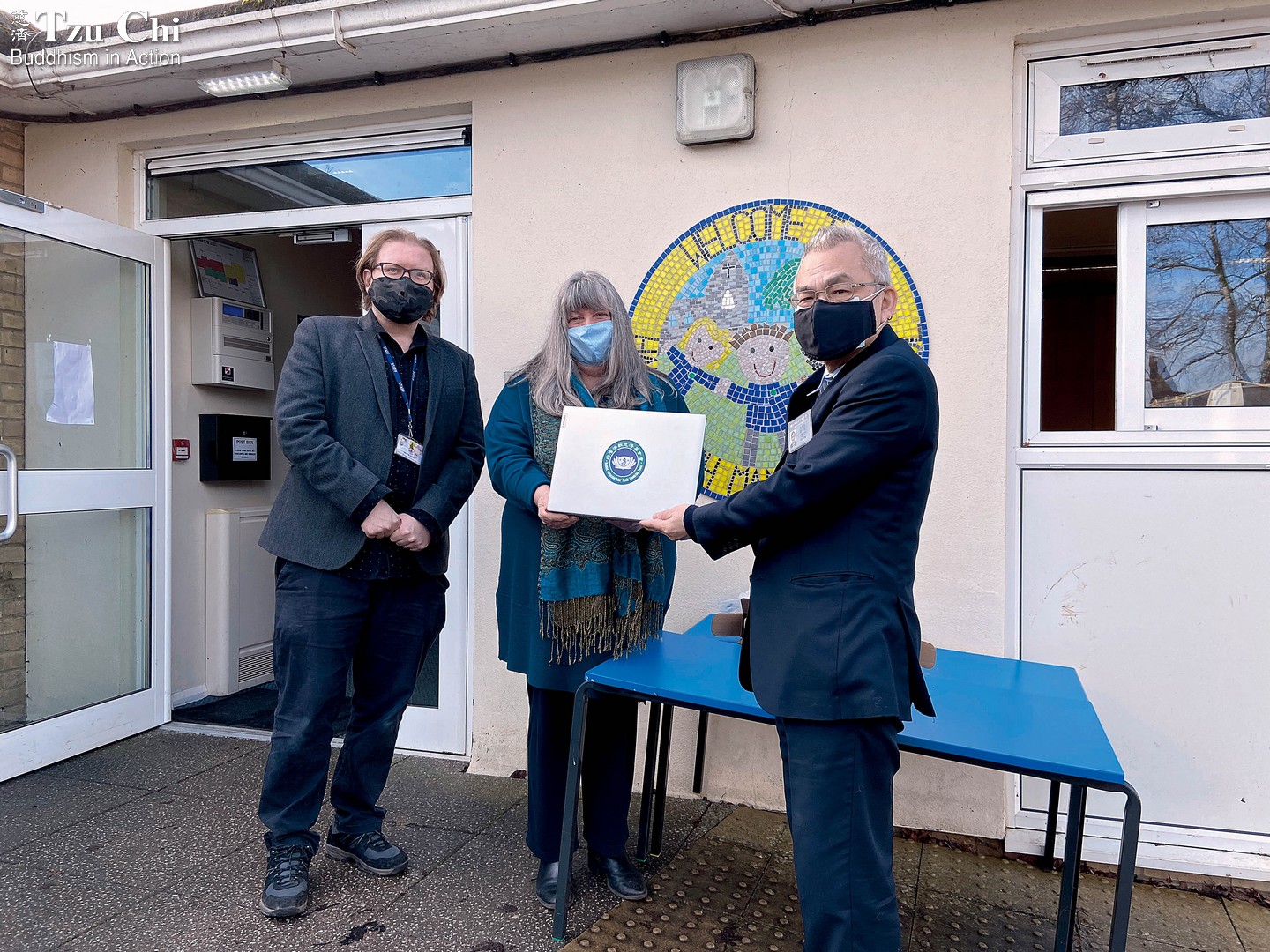
From January 5 to 12, 2021, Tzu Chi Cambodia distributed aid to more than 20,000 families in Battambang that had been affected by flooding. Lina Pha
Cambodia
The year 2020 was especially hard for Cambodia. The country was impacted by the coronavirus early in the year, followed by a serious drought that lasted from May to September. The drought was followed by tropical storms that led to severe flooding. Not long after the storms had passed, the pandemic situation in the country worsened.
Tzu Chi volunteers in Phnom Penh, Cambodia’s capital, originally planned to distribute aid to flood victims in the province of Battambang in December 2020, but that plan was derailed by the pandemic restrictions reinstated by the government in November. When the restrictions were lifted at the end of 2020, volunteers jumped into action. They held nine distributions in six districts in Battambang from January 5 to 12, 2021, during which rice and cooking oil were given to 20,131 families. To speed up distribution, three lines were organized at the venues: one for people who had come on foot, another for those on motor scooters, and a third for people arriving on farming tractors.
Conducting so many distributions in such a short time required cooperation from several groups. Tzu Chi volunteers worked with the police and military, as well as people from the Samdech Techo Voluntary Youth Doctor Association and the Union of Youth Federations of Cambodia. All told, 1,487 shifts were logged.
Tzu Chi volunteers had visited the disaster areas in Battambang twice in 2020 to assess damage. They learned that some regions had suffered from flooding for as long as a week, and some for even more than a month. Flood victims said they had already seen their incomes shrink as a result of the pandemic, and the drought and flooding just added insult to injury. They had had to take out loans to rent farmland and buy rice seeds and fertilizers to farm, but with their crops severely reduced by the natural disasters, they were now hard pressed to repay the loans. Some tried to supplement their incomes by fishing or working odd jobs, but it wasn’t enough. They were very grateful to Tzu Chi for easing their burden. They were also thankful that the foundation had thoughtfully considered the sizes of recipient families when they planned the events, so that larger families could receive larger portions. Many dropped money into the donation boxes placed at the venues out of gratitude.

Volunteers make face shields at the Kaohsiung Jing Si Hall, southern Taiwan. The face shields were provided to frontline workers in Taoyuan, northern Taiwan, after a hospital cluster infection broke out there in January 2021. Huang Xiao-zhe
Taiwan
A COVID-19 cluster infection erupted at Taoyuan General Hospital in northern Taiwan in January 2021, resulting in 21 confirmed cases, one of them fatal. The first two infections were reported on January 12. As the number of diagnosed cases continued to rise, an increasing number of medical and administrative workers at the hospital, as well as patients and families, were tested for the virus and ordered into quarantine on-site or elsewhere. At least 5,000 people were affected by the cluster infection. In response to the crisis, the Ministry of Health and Welfare launched a plan on January 22 to evacuate inpatients and reduce outpatient services. The hospital didn’t resume normal operations until February 19, when the cluster had been successfully contained.
On the morning of January 27, about 40 Tzu Chi volunteers gathered at Tzu Chi’s Taoyuan Jing Si Hall to prepare a thousand gift packs to be delivered to Taoyuan General Hospital. The packs contained herbal drinks, multi-grain porridge and powder, instant rice, Jing Si Aphorisms by Master Cheng Yen, and other items. With so many volunteers helping, the packing was completed in just two hours. The gift packs were delivered to the hospital at two thirty in the afternoon. As a precautionary measure, volunteers avoided any physical contact with hospital workers when they delivered the gifts to the hospital. They placed the gifts at one location to be taken away by hospital personnel.
“We’re very thankful to Master Cheng Yen for cheering us on by donating a thousand gift packs to us,” said Yu Pei-yu (余珮瑜), director of the social workers office at the hospital. “Empowered by such love and care, we’ll have more strength to tackle the challenge we are facing and take good care of patients.”
Tzu Chi also donated a thousand gift packs to the Taoyuan city government for distribution to people under quarantine in the city. As per the government’s request, the foundation also provided face shields, gloves, and other medical supplies to frontline workers. The face shields—more than 10,000—had been made by Tzu Chi volunteers, and could be reused after sterilizing. The first batch was made from January 27 to February 3 and immediately sent to the Taoyuan city government for distribution to frontline police officers. The second batch of 9,000 was produced during the Chinese New Year holiday after manufacturers had rushed out the materials to make more. Participating volunteers didn’t mind working during the New Year holiday; they were simply happy to have the chance to give and help people weather this crisis.

Tzu Chi worked with the military, villagers, and volunteers from Vertical Rescue Indonesia to rebuild a bridge in Depok, Garut, Indonesia. The new bridge was inaugurated on January 6, 2021. Moch Galvan
Indonesia
A suspension bridge connecting the villages of Depok, Paas, and Sinar Bakti in Garut, West Java, was destroyed by floods in October 2020. Without the bridge, villagers trying to go to work or school were forced to take detours or wait until the river was low enough to cross. Not only was this inconvenient—it could be downright dangerous.
When they learned about the situation, Tzu Chi volunteers in Bandung decided to work with the military to rebuild the bridge. Local residents and additional volunteers from Vertical Rescue Indonesia, a non-profit organization, pitched in to help with the project. The new bridge, 50 meters (260 feet) long and 1.2 meters (4 feet) wide, took more than a month to construct and was inaugurated on January 6, 2021. It’s made of stainless steel to be more durable.
Villagers were overjoyed at the completion of the new bridge. They were happy they could now go to work and back much more easily. They were also happy to see local business returning to normalcy. “Thank you, Allah! Thank you, Tzu Chi!” one villager exclaimed. “We hope all your volunteers remain safe and healthy!”

The pandemic in the U.K. forced many students to receive remote education at home. Some families, however, didn’t have computers at home to allow their children to learn during this critical time. Tzu Chi volunteers in England donated 15 laptop computers to Hanborough Manor CE School in Long Hanborough in February 2021 to help address the need. Peng Yi-zhen
The United Kingdom
On January 4, 2021, Boris Johnson, prime minister of the United Kingdom, announced a third national lockdown in England. Schools and colleges would be closed to all pupils except for those who were vulnerable or whose parents were critical workers. All other pupils and students would receive remote education.
In mid-January, Clare Morgan, headteacher at Hanborough Manor CE School, in Long Hanborough, Oxfordshire, wrote Tzu Chi requesting a donation of computers. The headteacher said she had received many phone calls from parents asking for help. These families didn’t have enough computers at home for all their children to receive remote education. In some families where there were no computers, parents had been letting their kids use their cell phones to learn remotely. Even so, their children were having difficulty completing their school assignments without the help of computers.
After evaluation, volunteers decided to donate 15 laptop computers to the school to help address the need. It took a while for the computers purchased by volunteers online to arrive because remote learning during the pandemic had resulted in a higher demand for computers. When the computers finally arrived, volunteers took them to the school on February 2. The headteacher sincerely thanked the foundation for making it easier for children at the school to learn during this difficult time.



